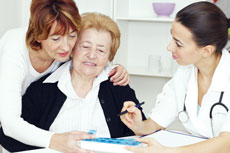
Older family caregivers rate the quality of their interactions with loved ones’ professional caregivers more positively than do younger family caregivers, according to newly released poll results from the Associated Press-NORC Center for Public Affairs Research.
Ten percent of respondents to the Long-Term Care Poll said they provide care or assistance for a loved one who lives in a senior living community or nursing home, with the balance providing care or assistance in the loved one’s home, their own home or someone else’s home.
Overall, caregivers who interact with their loved ones’ healthcare providers overwhelmingly said they had a positive experience, but the percentages were higher for those aged 40 or more years than for those aged 18 to 39 years:
- 93% of those aged at least 40 said providers explain things in a way that is easy to understand, compared with 81% of those aged 18 to 39.
- 92% of those 40 or older said providers listen carefully to them, compared with 85% of those aged fewer than 40 years.
- 90% of those aged 40 or more said they feel respected by healthcare professionals, compared with 77% of caregivers aged 18 to 39.
- 85% of those aged 40 or more years said providers ask about their loved one’s care preferences, compared with 73% of those aged 18 to 39.
- 81% of those aged 40 or more years said healthcare professionals involve them in caregiving decisions, compared with 72% of those aged 18 to 39.
Although almost all of the respondents said have accompanied their loved ones to medical appointments, less than 50% said they are formally authorized to communicate with healthcare providers about the treatment of the people they assist. Forty-five percent of the caregivers said they possess a legal document enabling them to make decisions about the loved one’s medical care if the person no longer can make them on his or her own, and another 46% said they have HIPAA authorization allowing healthcare providers to speak with them about their loved ones’ health and treatment.
The SCAN Foundation provided funding for the research.



